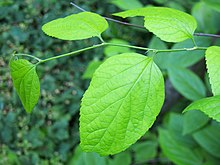Celtis caucasica
| Celtis caucasica | |
|---|---|

| |
| Foliage | |
| Scientific classification | |
| Kingdom: | Plantae |
| Clade: | Tracheophytes |
| Clade: | Angiosperms |
| Clade: | Eudicots |
| Clade: | Rosids |
| Order: | Rosales |
| Family: | Cannabaceae |
| Genus: | Celtis |
| Species: | C. caucasica |
| Binomial name | |
| Celtis caucasica | |
| Synonyms[2] | |
| |
Celtis caucasica, the Caucasian hackberry or Caucasian nettle tree, is a species of flowering plant in the family Cannabaceae.[3][4] It is native to the Caucasus region, Central Asia, and on to the western Himalaya.[2] Hardy to USDA zone 5b, it tolerates poor soils, drought, and nearby paving, and can be used as street tree.[5][6] It is a nitrogen-fixer, in symbiosis with the mycorrhizal fungi Funneliformis mosseae and Rhizophagus intraradices.[4]
References
- ^ Participants of the FFI/IUCN SSC Central Asian regional tree Red Listing workshop, Bishkek, Kyrgyzstan 11-13 July 2006 (2007). "Celtis caucasica". IUCN Red List of Threatened Species. 2007: e.T63520A12685995. doi:10.2305/IUCN.UK.2007.RLTS.T63520A12685995.en. Retrieved 13 May 2024.
{{cite journal}}: CS1 maint: multiple names: authors list (link) CS1 maint: numeric names: authors list (link) - ^ a b "Celtis caucasica Willd". Plants of the World Online. Board of Trustees of the Royal Botanic Gardens, Kew. Retrieved 19 October 2021.
- ^ "Celtis caucasica Caucasian nettle tree". The Royal Horticultural Society. 2021. Retrieved 19 October 2021.
- ^ a b Sepahvand, Tooba; Etemad, Vahid; Matinizade, Mohammad; Shirvany, Anoshirvan (2021). "Symbiosis of AMF with growth modulation and antioxidant capacity of Caucasian Hackberry (Celtis caucasica L.) seedlings under drought stress". Central Asian Journal of Environmental Science and Technology Innovation. 2 (1). doi:10.22034/CAJESTI.2021.01.03.
- ^ "Celtis caucasica". vdberk.co.uk. Van den Berk Nurseries. Retrieved 19 October 2021.
- ^ "Celtis caucasica Caucasian Nettle Tree". Chicago Botanic Garden. Forest Preserve District of Cook County. 2021. Retrieved 19 October 2021.

